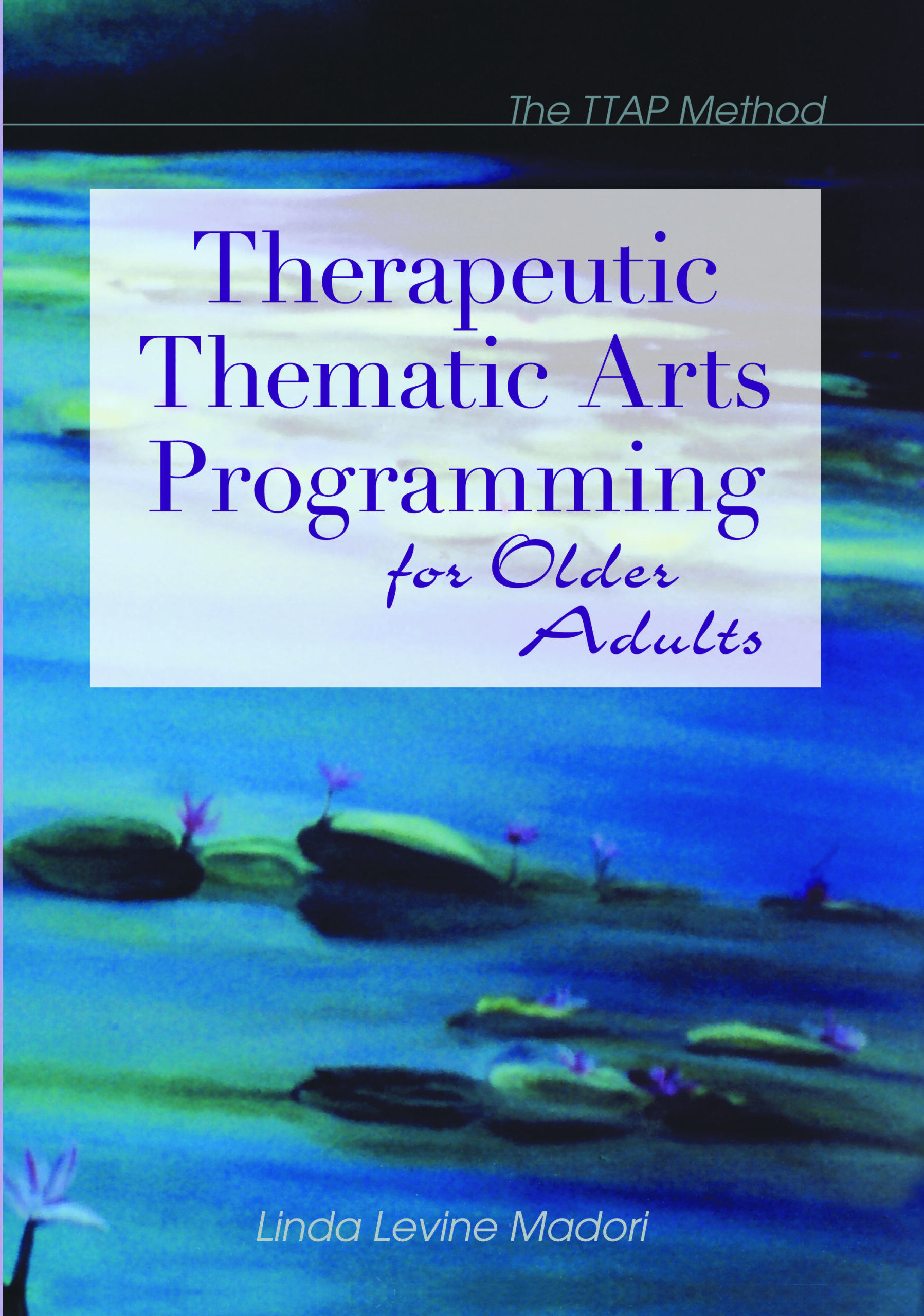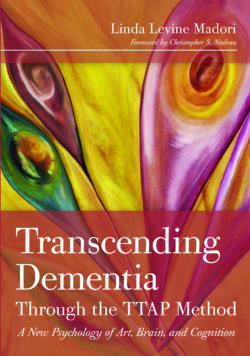Actively engage older adults and help preserve their cognitive functioning using this innovative, integrative approach to therapeutic art and recreation. Use Therapeutic Thematic Arts Programming (TTAP™) to create an enriching environment that effectively meets older adults’ cognitive, emotional, physical, and social needs.
In a clearly outlined nine-step process, Therapeutic Thematic Arts Programming involves exploring a broad theme through a range of artistic expressions, including music, dance, poetry, sculpture, and photography. Stimulating all areas of brain functioning, the TTAP method promotes older adults’ creativity and encourages them to exercise their remaining strengths and abilities. The approach also increases social interaction with its focus on dynamic group interaction.
While providing structure to creative art therapies, the TTAP method also allows for flexibility and individualization, allowing individuals within a group to have unique person-centered experiences. Appropriate for working with both well elders and those facing illness or disability, this integrative approach is solidly grounded in brain health research, biopsychology, and humanistic aging theories.
Full of suggestions for themes and activities, Therapeutic Thematic Arts Programming will serve as a valuable manual for recreation therapists and activity professionals. Additionally, the book’s discussion of current brain research, aging theories, and the benefits of creative art therapy make it a useful resource for instructors and students in the aging field.
TTAP™ is a trademark of the author.
About the Author
Acknowledgments
Introduction
- Therapeutic Thematic Arts Programming and Brain Functioning
- Underpinnings of Therapeutic Thematic Arts Programming and Applications with Older Adults
- Therapeutic Thematic Arts Programming in Therapeutic Recreation
- The Nine Steps of Therapeutic Thematic Arts Programming
- The Continuum of Psychological Domains in Therapeutic Thematic Arts Programming
- Using Therapeutic Thematic Arts Programming with Older Adults Who Need Assistance
References
Suggested Readings
- Appendix A: Program Protocols for Therapeutic Thematic Arts Programming: Tapping in to Creativity
- Appendix B: Activity Assessment Form for Therapeutic Thematic Arts Programming
- Appendix C: Sources for Art Supplies and Music
- Appendix D: Graphic Organizing Tools
- Appendix E: Themes in Therapeutic Thematic Arts Programming
Index
Linda Levine Madori, Ph.D., CTRS, ATR-BC, has been working in the field of gerontology as a therapist for more than 25 years. Her Ph.D. in Health Education focused on how the brain is stimulated through therapeutic activities which is the basis of her Therapeutic Thematic Arts Programming modality. As a Board Certified Art Therapist and a Therapeutic Recreation Specialist, Dr. Levine Madori has developed, implemented, and supervised clinical internships in both fields within the specialized area of aging. As an educator, she teaches undergraduate, graduate, and continuing education courses in Therapeutic Thematic Arts Programming, therapeutic recreation, art therapy, aging, and Alzheimer’s disease.
Currently Dr. Levine Madori is a Tenured Full Professor at St. Thomas Aquinas College in New York. Dr. Levine Madori is a two-time Fulbright Scholar (2007, 2009) teaching the TTAP Method courses and Certification Trainings in Australia, New Zealand, Finland, and China.
She is actively involved in The American Society on Aging, The American Art Therapy Association, The Society of Arts in Healthcare, and The American Therapeutic Recreation Association. Dr. Levine Madori has presented more than 500 professional papers on the arts, aging, and Alzheimer’s disease nationally and internationally.



admin –
“A wealth of practical ideas and tips. . . there is much [in Therapeutic Thematic Arts Programming for Older Adults] to generate new programs for creativity for all of us.”
–International Psychogeriatrics
admin –
“This text fills a void in our professional literature as well as serving as a useful resource to several audiences. [The book’s] chapters are outlined and organized for quick reference and easy reading and TTAP ideas are clearly presented and may be immediately incorporated into programming.”
-Marcia Jean Carter, Re.D., CPRP, CTRS, Associate Professor, Western Illinois University-Quad Cities
admin –
“This book brings together decades of innovation and current research in neurobiology to provide scientific grounding for recreational therapy. In addition, Dr. Levine Madori shares her insights and enthusiasm for the Therapeutic Thematic Arts Programming methods she has developed, refined, and tested in her extensive work with older adults.”
–Joan Hyde, Ph.D., Senior Fellow, Gerontology Institute, University of Massachusetts/Boston and Chief Executive Officer, Ivy Hall Senior Living, Boston, MA
admin –
“Dr. Levine Madori has developed an intriguing approach to therapeutic recreation programming for individuals with cognitive deficits … The book guides the reader to a greater understanding of the links between body, mind, and spirit, and the [TTAP] Method itself encourages creativity on the part of the practitioner as well as the consumer. Inevitably, all who use the Method, whether as therapists or participants, will gain a better understanding of and appreciation for their own creativity and need for self-expression.”
–Colleen Cooke, Ed.D., CTRS, Associate Professor of Therapeutic Recreation, Slippery Rock University
admin –
“The underlying tenet of this book is that later life is a time for growth and development, and irrespective of one’s state of well-being, need not be devoid of opportunities for learning and celebration … the book is easy to engage with and a must for anyone using the creative arts in the field of therapeutic recreation.”
–Bevan C. Grant Ph.D., Professor of Sport and Leisure Studies, University of Waikato, New Zealand
admin –
“Dr. Levine-Madori has developed an exciting technique of working with seniors. In Therapeutic Thematic Arts Programming for Older Adults, she presents a clear, well-thought-out program for professionals and family caregivers to interact creatively with the elderly of all cognitive levels.”
–Doris Tavel Zuckerberg, LMSW, Director of Older Adult Programs, Jewish Family Service of Rockland County
admin –
“Whether the Leisure Ability Model of service directs your practice or not, this intervention is a sound protocol that can be used effectively in any outcome based, individual-centered plan of care … although the target population for the TTAP is older adults, the intervention offers a framework for designing other interventions to tap the power of therapeutic activity for each of five domains for other populations throughout life.”
–Carla E.S. Tabourne, Ph.D., CTRS, Associate Professor of Recreation Therapy, University of Minnesota, School of Kinesiology
Pamela Berezin –
Dr. Levine Madori provides a wealth of knowledge and evidence to the field of cognitive health. Her books and literature are inspirational and passionate. Her TTAP technique has already improved the lives of individuals that have cognitive decline, with the adaptability to enhance the lives of all populations. This book, in addition to her many others will be a great attribute to any field that wishes to treat and nurture the “whole” person.
Pamela Berezin, Master’s Student of Therapeutic Recreation, Indiana University, Bloomington